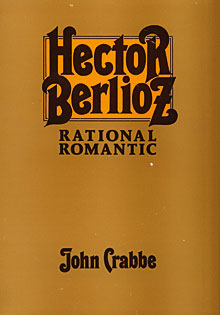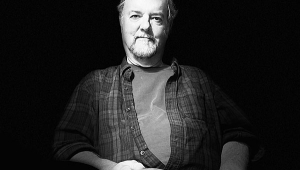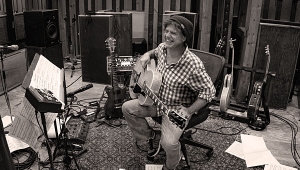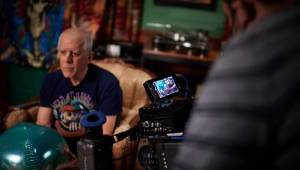| Columns Retired Columns & Blogs |
John Crabbe: Firebrand Page 5
How did you find time to write that while you were Editor?
Footnote 2: According to Amazon.com, Beethoven's Empire of the Mind was eventually published in the US in 1987 by Pro Am Music Resources.—Ed.
"Well, it was hard bloody work! But of course I was able to use the office facilities, because it was to be published by Blandford, which was part of the Link House group. I had all the backup I needed, secretarial and everything else, all the drawings and so forth, and that eased matters. I had to do all the writing myself, and I had a family with young children, but by that time I had reasonable assistance in the office, so I could give time to the book."
1976 saw John Crabbe's first prolonged absence from the magazine since that road accident of 1963.
"I started having problems with angina towards the end of 1975, and eventually it was discovered that I needed a triple bypass, then a fairly rare operation in the UK. In the middle part of 1976, after having the operation, I was convalescing at home and I was unable to take part in the Audio Award of that year, which was given to Colin Davis—a pity, because I'd interviewed him at great length, and because of the Berlioz connections—but Peter Gammond, who had come from Record Review and was still the Music Editor, stood in for me."
While convalescing at home, John interviewed Paul Messenger, who was then hired as Deputy Editor.
"Of course, Paul had very much embedded himself by the time I got back."
By then, John Atkinson had joined as News Editor. Even then, there were still only three product reviews a month.
"Yes, the equipment-review section was still 'the bit at the back,' as it were. This used to annoy John Atkinson, of course. His was an influence in favor of more review coverage, and he thought it was wrong that it should be at the back, as it had been under Miles Henslow—it had just stayed that way, really."
There were difficult times ahead. Mass-market hi-fi was reaching saturation point, and when home videocassette recorders burst on the scene in 1978, the great hi-fi boom was really over. Public attention switched to the marvels of video, and hi-fi began to become old hat. When the UK economy dipped into recession in 1981, the going got even tougher for the hi-fi business and for hi-fi magazines.
In June 1982, John and the other members of the team were shaken by the suicide of valued staff member Geoff Jeanes, who for most of his 10 years on the magazine had edited the record-review section and contributed excellent cartoons under the name "Bod." It was a time of upheaval, and time for John to bow out. The industry he had once known so well was struggling painfully to reinvent itself, and John was not in sympathy with a new generation of hi-fi enthusiasts who either ignored or questioned the validity of the traditional kinds of technical assessment. So JC handed over the reins to JA, who would remain as Editor until he left to join Stereophile, in 1986. Paul Messenger was made Publisher.
John Crabbe continued to contribute music reviews and, from the late 1980s until recently, an opinion column, "Sidelines." Following a divorce, he eventually moved from London to a pretty village in the Yorkshire Dales, where he enjoyed his books, his music, and his collection of landscape prints. Among the pictures on his walls were works of Barbara Bodichon, the 19th-century painter and feminist, a close friend of the writer George Eliot, and cofounder of the movement for women's suffrage.
 Regular Hi-Fi News readers might not know that John would become a noted authority on Bodichon, but they could hardly be unaware of his enthusiasm for Berlioz, which had begun early on.
Regular Hi-Fi News readers might not know that John would become a noted authority on Bodichon, but they could hardly be unaware of his enthusiasm for Berlioz, which had begun early on.
"During that first year when I was at Decca at Brixton, they were pioneering ffrr, and they occasionally offered staff members the opportunity to go to a concert where one of their artists was performing. At one of these, Victor de Sabata was conducting Berlioz's Roman Carnival, which of course is the most popular of all his overtures, but it was new to me. It somehow stuck in my mind as a real epitome of great use of the orchestra. That was one starting point. That encouraged me to pick up the odd recording, but much later, there was a concert production of The Damnation of Faust at the Fairfield Halls in Croydon, with the Chelsea Opera Group, and I was completely overwhelmed. I joined the Berlioz Society, and got to know a number of enthusiasts.
"Then, I'd always been interested in the history of ideas, and I had a long-term project to write a book called Thoughts and Beliefs of the Great Composers. And I started research on this—a vast subject, of course. Anyway, in the respective centenary years—1969, which was the centenary of Berlioz's death, and 1970, the bicentenary of Beethoven's birth—because there was so much publicity and material around, I wrote what were intended to be the chapters on Berlioz and Beethoven.
"By this time I was beginning to wonder whether I could ever make the whole book. I wondered if I could meld the Berlioz and Beethoven chapters into a sort of combined book, but more and more material was flooding in, and each was being expanded. And I thought, Why not make a book of each? That's how the Berlioz book was born.
"It was published by Kahn & Averill, although Maurice Kahn did persuade me to pull one chapter out and make it an appendix. I'd come across a curious set of connections, almost occult connections, between Berlioz, who was born in 1803, and the Irish patriot Robert Emmett, who was executed in 1803 for an unsuccessful uprising against the English. And I thought, in the last resort, perhaps Berlioz was a reincarnation of Emmett."
John's Beethoven chapter eventually became Beethoven's Empire of the Mind.
"Maurice Kahn didn't want to take that on; he wanted to wait and see how the Berlioz book went. But then, at a book fair, I met Alan Lovell, who'd worked on Hi-Fi News in the early days and now had a printing business. I told him about the Beethoven book and he said he would take it on, even though he wasn't really a book publisher. He printed 2000 copies but bound only 1000, pending sales. It trickled out, and went along quite nicely, got a few favorable reviews. One American professor, Hugh MacDonald, a great authority, said that my chapter on Beethoven's religious position was the most complete, comprehensive, believable, and thorough study of that aspect that he'd ever found, and recommended it to all his students."
After this, Maurice Kahn offered to take the book on as publisher if the remaining copies could be bound, but the unbound copies had all been ruined in a warehouse flood. "One of those things!" says John, stoically (footnote 2).
"I've had this possible book in mind on the history of sound; I've done most of the research but not much writing. I have written a large article, which is out with one of the magazines at the moment, on the Pythagorean connection—the music of the spheres and this great myth of the sounds from the planets—the full story, right up to Kepler. That would form a complete long chapter in a book..."
Footnote 2: According to Amazon.com, Beethoven's Empire of the Mind was eventually published in the US in 1987 by Pro Am Music Resources.—Ed.
- Log in or register to post comments




































